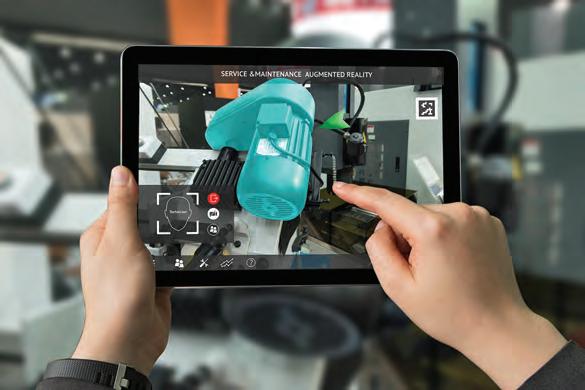INDUSTRY 4.0 the risk and lessen the risk of technology adoption for manufacturers,” Bakshi says. “We do a lot of proof of concepts and pilot projects. We create technology showcases so that they can see how they could benefit from implementing it in their businesses.” With four hubs in Quebec to demonstrate the complete value chain for implementing Industry 4.0 – from the design side, to the Cloud – Siemens offers training and testing. Says Bakshi, “Companies can come in and test technologies to see how they will behave. From there we provide solutions and show how they can implement them.” The Siemens approach is to look into a manufacturer’s complete operations. “We prioritize what systems are near go so they can get a quick return on their investment,” he notes. “But we emphasize that it’s just part of an overall system based on their business model. We look at it step-by-step so they can see where to invest.” There’s a lot of buzz that goes with advanced technologies. Bakshi says ignore it. “Focus on the business case and what they want to get out of their investment.” Investing in integrated digital solutions to boost productivity may seem a daunting task for small manufacturers but collaborations with other manufacturers, business consultants, applied learning institutions, research and development departments, and industry suppliers will improve competitiveness. Getting started on a factory of the future will set your company up for business success in the years ahead. Kim Laudrum is a Collingwood, Ont.-based business writer and regular contributor to PLANT. E-mail klaudrum@ rogers.com. Comments? E-mail jterrett@plant.ca.
14 PLANT
PLT_JanFeb2020_issue_AMS.indd 14
Using a tablet to perform maintenance check on a motor.
Slow to
PHOTO: ZAPP2PHOTO - STOCK.ADOBE.COM
ADOPT WE ARE LAGGING IN DIGITAL TRANSFORMATION SMEs see value in advanced manufacturing technology but have concerns. BY PLANT STAFF
M
anufacturers around the world are adopting Industry 4.0 technologies and integrating digital solutions that optimize their processes. But Canadian companies have not been quick to go digital, according to the 2020 Advanced Manufacturing survey of mostly small and medium-sized manufacturers. Industry 4.0 focuses on automation, interconnectivity, machine learning and the analysis of real time data that involves the Industrial Internet of Things (IIoT), the cloud, advanced computing and artificial intelligence. The survey, conducted by PLANT Magazine for sponsor BDO Canada LLP, looked at how
251 owners and senior executives view these technologies and probed companies’ level of adoption. Many see the value of advanced technologies but are wary of costs and return on investment as they continue to apply more traditional manufacturing methods. They’re also concerned that people with the skills necessary to make the most of digital technologies and networks are in too short supply. Challenges include data being complicated and requiring special knowledge, increased cybersecurity risks, and the massive investment needed to replace machinery. “Most executives (87%) realize that Canadian manufacturers are competing with companies around the world. And almost 80% see the Industrial Internet of Things as a business growth opportunity,” said Mike Gillespie, partner, and manufacturing leader at BDO Canada LLP, an accounting, tax and advisory
firm. “Sixty-four per cent of respondents say manufacturers with smaller operations have more to gain from Industry 4.0. This is welcome news. The first step to change is acknowledging the need to change.” But just 24% of executives are currently applying IIoT, 36% are planning or evaluating, 24% aren’t familiar with the technology’s capabilities and 15% stated IIoT is not applicable to their operations. They see the top IIoT applications as: improving efficiency and productivity (33%); providing more visibility into production processes (23%); improving maintenance functions (22%); tracking materials and shop floor assets (20%); and pulling together business data from shop floor to top floor (20%). Challenges encountered while implementing technology strategies include resistance to change (51%), lack of skilled talent (48%), funding (46%) and integrating with legacy technology (36%). Most companies are using traditional means to compile information. Seventy per cent are using spreadsheets such as Excel for production and material planning, and 46% use accounting packages while 43% generate manual paperwork. Integrating ERP for the supply chain was cited by 35% of respondents and MRP by 26%. Only 14% are employing sensors to capture big data. Research firm RK Insights in Toronto conducted the survey through July and August. The margin of error is +/- 5%, 18 times out of 20. Most of the companies are small: 52% have fewer than 50 employees and 47% of respondents hold controlling or minority ownership, or have partners. Average annual revenue of all respondents is $65.7 million, but 52% take in less than $10 million. Download the survey results and executive roundtable report at www.plant.ca/2020-advanced-manufacturing-report/.
January/February 2020
2020-01-31 1:06 PM










